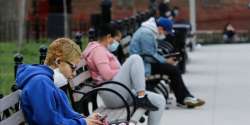Social distancing reduces chance of Covid-19 infection: Study
While using public transportation, visiting a place of worship, or otherwise travelling from the home is linked to a significantly higher chance of getting infected from Covid-19, the study published in the journal Clinical Infectious Diseases, reported.

Researchers, including one of Indian-origin, have found that practicing strict social distancing is associated with a markedly lower likelihood of testing positive with the Covid-19 virus.
While using public transportation, visiting a place of worship, or otherwise traveling from the home is linked to a significantly higher chance of getting infected from Covid-19, the study published in the journal Clinical Infectious Diseases, reported.
"Our findings support the idea that if you're going out, you should practice social distancing to the extent possible because it does seem strongly associated with a lower chance of getting infected," said study senior author Sunil Solomon from Johns Hopkins University in the US.
For their analysis, the researchers surveyed a random sample of more than 1,000 people in the state of Maryland, asking about their social distancing practices, use of public transportation, SARS-CoV-2 infection history, and other Covid-19-relevant behaviours.
They found that those reporting frequent public transport use were more than four times as likely to report a history of testing positive for Covid-19 infection, while those who reported practicing strict outdoor social distancing were just a tenth as likely to report ever being Covid-19 positive.
The study is believed to be among the first large-scale evaluations of Covid-19-relevant behaviours that is based on individual-level survey data, as opposed to aggregated data from sources such as cellphone apps.
The results indicated that 55 (5.3 per cent) of the 1,030 participants had tested positive for SARS-CoV-2 infection at any time, while 18 (1.7 per cent) reported testing positive in the two weeks before they were surveyed.
The researchers found that when considering all the variables they could evaluate, spending more time in public places was strongly associated with having a history of SARS-CoV-2 infection.
An infection history also was 16 times more common among those who reported having visited a place of worship three or more times in the prior two weeks, compared to those who reported visiting no place of worship during the period.
Also, those who reported practicing social distancing outdoors "always" were only 10 per cent as likely to have a SARS-CoV-2 history, compared to those who reported "never" practicing social distancing.
The results are consistent with the general public health message that mask-wearing, social distancing, and limiting travel whenever possible reduce SARS-CoV-2 transmission, the authors noted.
Last month, a study published in the journal PLOS Medicine, revealed that US government-issued physical distancing orders significantly slowed the Covid-19 pandemic, leading to an estimated reduction of more than 600,000 cases in the US within three weeks of implementation.